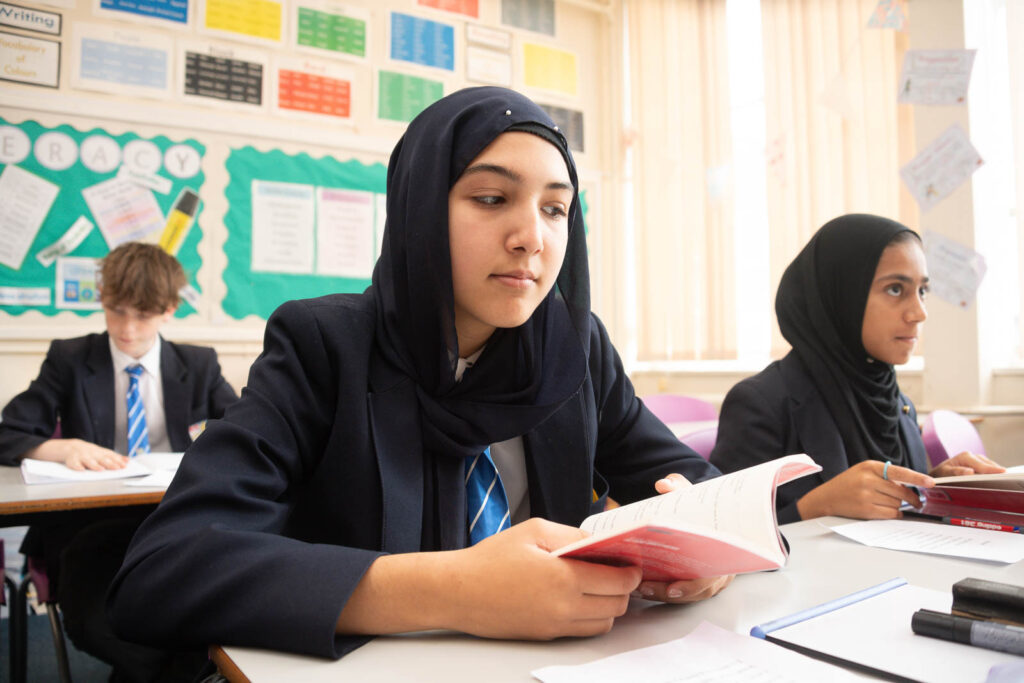Home » Curriculum » Reading

At Archbishop Ilsley Catholic School we firmly believe that literacy is the foundation block of academic success. All pupils need to be able to read, write, and talk as experts in every subject across the curriculum. These skills however are also vital for life outside of school and study. Literacy skills help us to make sense of the world around us.
“We learn the rule of decent behaviour from parents and teachers and friends and books.” (The Abolition of Man, C. S. Lewis).
We believe that reading, and particularly reading for pleasure, has a direct impact on cognitive and social communicative development; reading and the knowledge it brings, provides us with a stronger sense of belonging to society, enhances empathy and furnishes us with higher levels of self-esteem and a greater ability to cope with difficult situations.
“Reading is a way for me to expand my mind, open my eyes and fill up my heart.” – (Oprah Winfrey)
Reading for pleasure has been shown to improve health and wellbeing. Reading has been associated with better sleeping patterns, enhanced relaxation, calmness and concentration. Those who read regularly experience fewer feelings of stress and depression, and stronger feelings of relaxation than those gained from watching television or engaging in technology-intensive activities/social media.
Thus, it is our aim to develop each pupil’s potential and to enable students to be reading at or above their chronological age.
Improving literacy in secondary schools, Education Endowment Fund, 2019
In each of our subject areas, teachers prioritise and explicitly teach pupils the reading strategies that they need in order to be successful in the discipline. Pupils will be taught the ‘Ilsley Super Reading Strategies’.
At Archbishop Ilsley, we are committed to empowering pupils by widening their vocabulary. We are ambitious and aspirational with regard to vocabulary acquisition. We understand the impact that vocabulary has on the quality of work, progress and the ability to express ideas and concepts. Each subject has a published vocabulary list that allows pupils to speak and write as experts. Vocabulary is tested through low-stakes quizzing in lessons and vocabulary tasks are set frequently for homework. Vocabulary is explored fully in all subject areas. Pupils experience reading keywords in context, use new vocabulary in their written work and develop confidence with new vocabulary in speaking tasks.
We understand the link between confident, fluent reading and confident, articulate speaking. Opportunities for talk in the classroom are planned and deliberate. Pupils learn language across the curriculum to support their oral contribution. Opportunities exist in every subject to prepare speech through presentations, debates and discussions.
There are many literacy enrichment activities:
“Acquiring literacy is an empowering process, enabling millions to enjoy access to knowledge and information which broadens horizons, increases opportunities and creates alternatives for building a better life.”
Kofi Annan, Seventh Secretary-General of the United Nations
Proudly part of the St. Teresa of Calcutta Multi Academy Company.
Registered Company No. 11844357. Registered Address:
St Joseph’s House | 1157 Warwick Road | Acocks Green | Birmingham | B27 6RG
Tel: 0121 706 4200 | info@stocmac.org.uk
© 2024 All Rights Reserved.